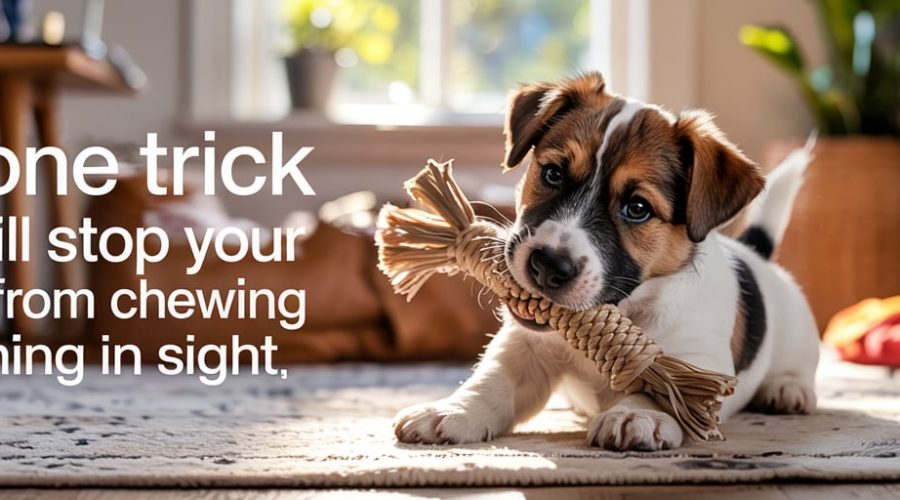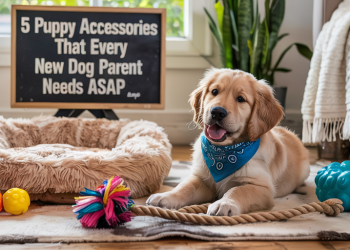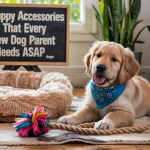Are you tired of coming home to chewed-up shoes, gnawed furniture, and destroyed belongings? 🐾 If you’re a new puppy owner, you’re likely familiar with the frustration of finding your beloved items in tatters. But don’t despair! There’s a simple, yet effective trick that can save your possessions and your sanity.
Puppies chew for various reasons – from teething discomfort to instinctual behavior. As Certified Animal Behaviorist Caroline Wilkinson explains, chewing not only helps alleviate pain during teething but also triggers the release of calming hormones. But what if traditional teething toys aren’t cutting it? That’s where our secret weapon comes in: the humble carrot. 🥕 This unexpected solution not only redirects your puppy’s chewing tendencies but also provides a soothing effect for those sore gums.
In this blog post, we’ll explore the reasons behind your puppy’s chewing habits, introduce you to the carrot solution, and guide you through creating a puppy-friendly environment. We’ll also delve into the power of positive reinforcement in managing chewing behavior and provide additional resources to support your puppy training journey. Get ready to transform your home from a puppy’s chew toy paradise to a harmonious living space for both you and your furry friend!
Understanding Why Puppies Chew
A. Teething discomfort and pain
Puppies chew to alleviate the discomfort of teething, similar to human babies. This natural behavior helps strengthen their jaws and promotes dental health. Providing appropriate chew toys can redirect this instinct and ease their pain.
B. Instinctual behavior for dental health
| Chewing Benefits | Examples |
|---|---|
| Jaw strengthening | Rubber toys |
| Dental hygiene | Nylon bones |
| Mental stimulation | Puzzle toys |
C. Stress relief and comfort seeking
Chewing also serves as a stress-relief mechanism for puppies. Insufficient exercise or attention can lead to destructive chewing. Regular exercise and playtime are crucial to expend excess energy and prevent boredom-related chewing behaviors.
Now that we’ve covered why puppies chew, let’s explore “The Carrot Solution: A Simple Yet Effective Trick” to manage this behavior effectively.
The Carrot Solution: A Simple Yet Effective Trick
A. Introducing frozen carrots as chew toys
Now that we understand why puppies chew, let’s explore a simple yet effective solution: frozen carrots. These nutritious vegetables offer a safe and soothing alternative to harmful chewing habits. Frozen carrots not only satisfy a puppy’s natural chewing instincts but also provide relief for teething discomfort.
B. Benefits of carrots for teething puppies
| Benefit | Description |
|---|---|
| Pain relief | Cold temperature numbs sore gums |
| Dental health | Firm texture helps remove plaque |
| Nutritional value | Rich in vitamins A, B, C, and K |
| Safe alternative | Edible and non-toxic |
With these benefits in mind, next, we’ll explore how to properly offer carrots to your puppy, ensuring a positive reinforcement approach to chewing management.
Positive Reinforcement in Chewing Management
While the carrot trick provides a simple solution, positive reinforcement is key to managing puppy chewing behavior effectively. Let’s explore how to implement this approach:
A. Redirecting focus to appropriate chew toys
- Offer safe, engaging toys
- Guide puppy to toys when caught chewing inappropriately
- Praise enthusiastically when puppy uses correct items
B. Rewarding good chewing behavior
| Reward Type | Examples |
|---|---|
| Verbal | “Good boy!”, “Well done!” |
| Physical | Petting, belly rubs |
| Treats | Small, healthy snacks |
C. Avoiding punishment for inappropriate chewing
Punishment can lead to confusion and fear, damaging trust. Instead, calmly redirect and reinforce positive behaviors. With these techniques in place, creating a puppy-friendly environment becomes the next crucial step in preventing destructive chewing.
Creating a Puppy-Friendly Environment
Now that we’ve covered positive reinforcement, let’s focus on creating a puppy-friendly environment to prevent destructive chewing.
A. Identifying and removing potential chewing hazards
- Secure electrical cords
- Store cleaning supplies and medications in high cabinets
- Keep trash cans out of reach
- Remove toxic plants
- Eliminate small choking hazards
B. Providing a variety of suitable chew toys
| Type of Toy | Benefits |
|---|---|
| Rubber toys | Durable and safe |
| Rope toys | Clean teeth |
| Puzzle toys | Mental stimulation |
C. Establishing designated chewing areas
Create a safe space with a comfortable bed and appropriate toys for your puppy to enjoy. Use baby gates or playpens to restrict access to unsafe areas. Regular inspections and adjustments are necessary as your puppy grows.
With these measures in place, you’ll be better prepared for the challenges of puppy ownership. Next, we’ll explore additional resources for puppy training to further support your journey.
Additional Resources for Puppy Training
Now that we’ve explored creating a puppy-friendly environment, let’s look at additional resources to support your puppy training journey.
A. AKC e-books and training guides
The American Kennel Club (AKC) offers comprehensive e-books and training guides specifically tailored for puppy owners. These resources provide expert advice on:
- Proper socialization techniques
- Basic obedience training
- Addressing common behavioral issues
B. Professional dog training services
| Service Type | Benefits |
|---|---|
| Group classes | Socialization, structured learning |
| Private sessions | Personalized attention, targeted problem-solving |
| Board and train | Intensive training in a controlled environment |
Managing a puppy’s chewing habits requires patience, understanding, and effective strategies. By introducing frozen carrots as a teething aid, you can redirect your puppy’s chewing instincts while providing relief for their sore gums. This simple yet effective trick, combined with positive reinforcement and a puppy-friendly environment, can significantly reduce destructive chewing behavior.
Remember, every puppy is unique, and finding the right solution may take time. Consistency in training, coupled with the resources available from organizations like the American Kennel Club, can help you navigate the challenges of puppy ownership. With dedication and the right approach, you’ll be well on your way to fostering good habits and creating a harmonious home for both you and your furry friend.













Comments (0)